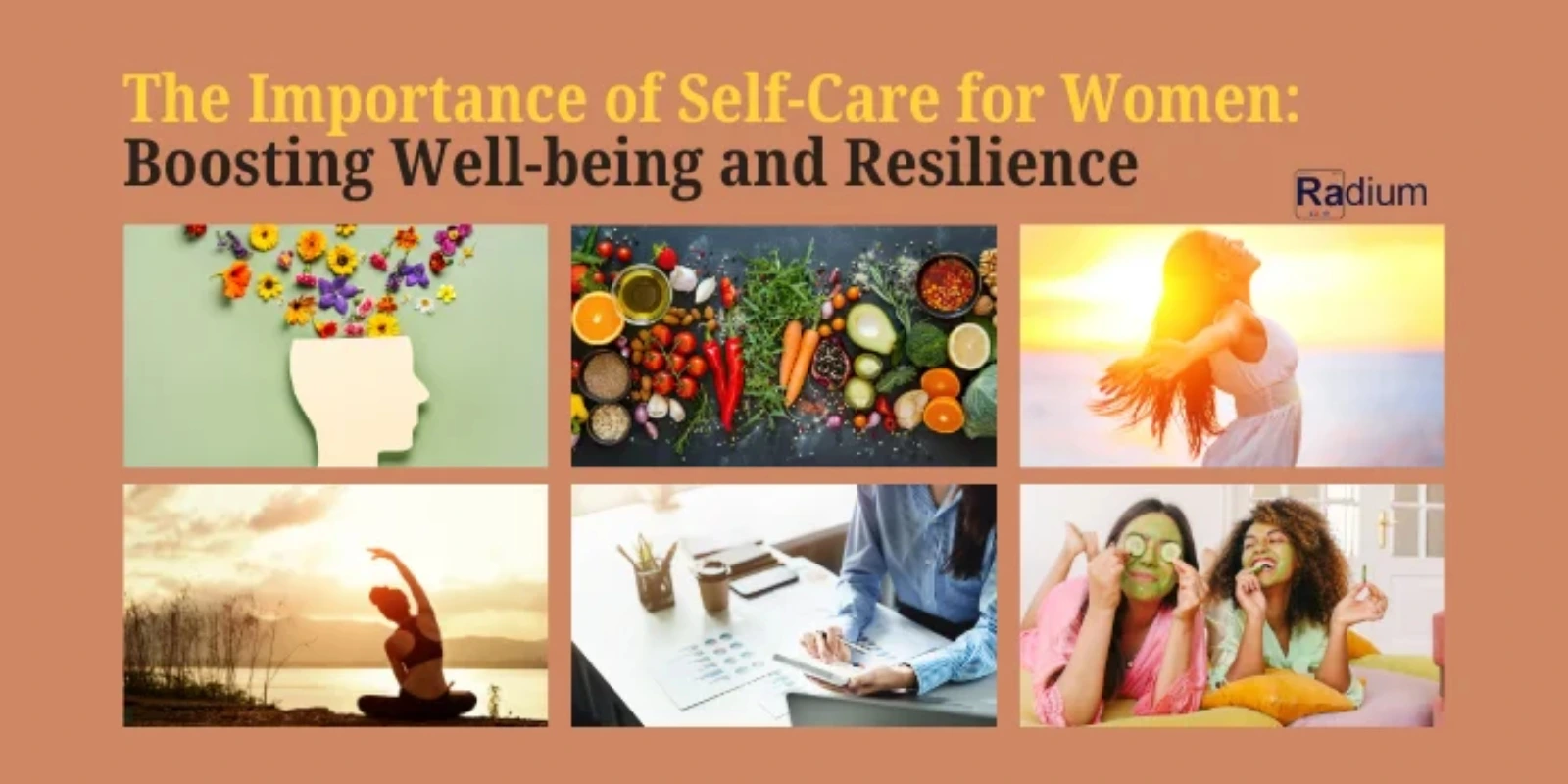
The Importance of Self-Care for Women: Boosting Well-being and Resilience
Today’s women juggle in between many roles—professional, caregiver, friend, and more. In all this hustle, self-care often gets pushed aside. But neglecting oneself isn’t just unfair—it’s unhealthy. Self-care is not a luxury, it’s a necessity. This blog explores why self-care matters for women, how it boosts well-being and resilience, and simple ways to prioritize it daily.
What is Self-Care?
Self-care is taking proactive measures toward protecting and enhancing your body, emotional, and mental well-being. It has a lot of activities involved in its processes, more than the popular view of bubble baths and spa days as indulgent practices. True self-care is about making conscious decisions daily that put your needs first, whether it is in the form of exercise time, mindfulness practice, or simply allowing yourself to rest when needed. It’s about recognizing your worth and ensuring that you make time for activities that rejuvenate your spirit and enhance your quality of life. It integrates self-care into your daily routine as a foundation for resilience and balance, enabling you to manage stress and face all the challenges of the day better. This proactive approach not only improves your well-being but also empowers you to show up in all areas of life at your best, which leads to healthier relationships and a more fulfilling existence.
Why Self-Care is Essential for Women
Women bear the burden of not just their emotional and psychological life but also the care that others put on their shoulders, be it a daughter or a mother. This caregiver-professional-friend load often weighs them down to the point of their needing self-care, otherwise a possible burnout, anxiety, and chronic health problems set in. Self-care empowers women to recharge and care for themselves, thus growing in all aspects of their lives. It is no longer a luxury but an essential necessity to maintain mental clarity and emotional stability. By taking time for themselves through exercises, hobbies, or any relaxation techniques, women establish a sense of empowerment and worth. This is not only a healthy habit for oneself but also with family and friends. When one acknowledges that she needs self-care, then she would be breaking the cycle of self-neglecting herself and starting to have a healthier lifestyle supporting both of her needs.
The Link Between Self-Care and Resilience
Self-care is an important aspect because resilience implies the ability to bounce back, so developing the strength from within is very significant. Exercise, meditation, or doing arts for women in general, in some way creates a positive attitude that makes them better and more resilient in dealing with stress. Self-care reduces anxiety levels, allowing individuals to remain emotionally balanced even during hard times. But importantly, consistent self-care routines make women feel more energized and focused, allowing them to take care of day-to-day tasks much better. By becoming resilient, they learn healthier coping strategies, thus helping them manage more effectively the ups and downs of life. They are better positioned to engage in further self-care practices. In summary, then, investment in self-care is an important strategy for enhancing overall well-being and fortifying resilience against the challenges of life.
Physical Self-Care: Care for Your Body
Body care is not impotent it’s essential.
Exercise Frequently: Keeps you fit and uplifts your mood.
Nutrition Counts: Eat wholesome food.
Sleeping Properly: Sleep for 7–8 hours of quality sleep.
Neglecting these results in tiredness and health problems over time.
Mental Self-Care: Feeding the Mind
Overthinking, work stress, and continuous multitasking can exhaust you mentally. Your mind needs rest, too.
Mindfulness: Pay attention to the present moment.
Limit Screen Time: Cut down on phones or laptops.
Read Books or Journals: Stimulate your brain positively.
Emotional Self-Care: Healing from Within
Acknowledge emotions and deal with them.
Write in a Journal: Vent out thoughts without judgment.
Talk to a Therapist: Professional guidance can help.
Express Yourself: Art, music, or dance can be therapeutic.
Social Self-Care: Building Meaningful Connections
Humans are social beings. Good relationships uplift and support us.
Reach Out: Call or meet loved ones regularly.
Join a Community Group: Share interests and make friends.
Set Boundaries: Say no to toxic or draining relationships.
Financial Self-Care: Reducing Stress Through Planning
Financial stability brings peace of mind.
Create a Budget: Avoid overspending and manage savings.
Emergency Fund: Be prepared for unexpected events.
Invest Wisely: Secure your future with long-term goals.
Self-Care and Work-Life Balance
Balancing work and life isn’t easy, but it is necessary.
Take Breaks: Brief intermissions sharpen concentration.
Learn to Delegate: Share burdens at work and at home.
Plan Vacations: Unwind and recharge periodically.
Barriers Women Face in Practicing Self-Care
Many women feel guilty or selfish when prioritizing themselves, partly because of societal expectations that stress selflessness and caregiving. This cultural conditioning may lead to a strong feeling of obligation to prioritize the needs of others—be it family, friends, or colleagues—over personal well-being. Also, the demands of playing the different roles of a professional, caregiver, and friend may hardly leave time for self-care. Most women say they are overwhelmed with responsibilities, so they hardly find time for themselves and end up neglecting their health and happiness. The first step towards overcoming the barriers is by recognizing them. The first step in moving from such a mentality is when they recognize that self-care is not a privilege but a need to ensure good physical and mental health. This means asking questions around the assumption that the time taken for oneself is selfish and instead, an investment in one’s capacity to care for others properly. Under such illumination, women can be empowered not to shy away from self-care.
Overcoming Guilt Associated with Self-Care
Self-care is not selfish, it’s the necessary step toward being your best self. Many women have those feelings of guilt when taking time out for themselves because they tend to believe that first comes responsibilities. In contrast, their own well-being should take precedence to stay in the balance and avoid burnout. It can start with tiny changes that one can fit into one’s schedule, such as a 10-minute walk or a peaceful coffee break. These small moments of self-care can really add up and make a huge difference in your overall mood and energy. Remember, you are worthy of love and care too. Taking time for yourself allows you to be more mindful and productive elsewhere in life. You could also talk to friends or journal your emotions to help you to overcome that guilt. The step-by-step introduction of self-care into your life will help you develop a much healthier mindset that values your needs as much as other people’s. Remember that caring for yourself is not only good for you but also improves you in taking care of other people.
Simple Daily Self-Care Practices
- Drink Water: Stay hydrated throughout the day.
- Stretch: Take 5 minutes to stretch your body.
- Breathe Deeply: Practice deep breathing to calm your mind.
- Take a Walk: Enjoy fresh air and nature’s serenity.
- Smile: Watch a funny video or chat with a friend.
Long-Term Benefits of Consistent Self-Care
- Better Health: Fewer illnesses and higher energy levels.
- Stronger Relationships: When you’re happy, it reflects in your connections.
- Improved Productivity: A well-rested mind works better.
Conclusion: Putting Yourself First Isn’t Selfish
Self-care is about creating a healthier, happier, and more resilient version of yourself. Start today with small changes. Remember, you can’t pour from an empty cup—prioritize yourself to give your best to others.
Frequently Asked Questions
Que.1: Does self-care help in mental health?
Ans. Yes, daily self-care reduces stress and increases mental well-being.
Que.2: Is self-care expensive?
Ans. Not at all! Such an act as walking or journaling is absolutely free but brings about the most difference.
Que.3: How much time should I allocate to self-care each day?
Ans. Even 10–15 minutes a day can make a difference.
Que.4: What is the best way to start a self-care routine?
Ans. Start with small, achievable habits like hydrating or deep breathing.
Que.5: Can self-care help prevent burnout?
Ans. Absolutely! Self-care helps one to recharge and refocus through regular practice.
